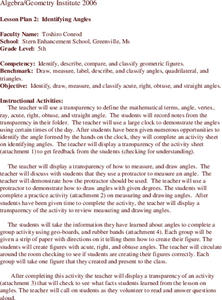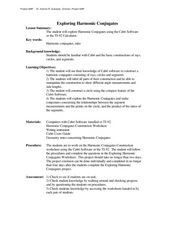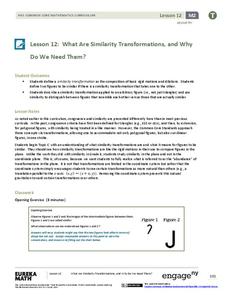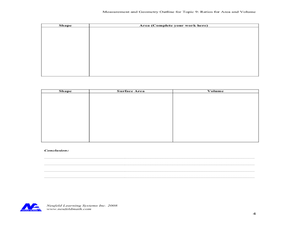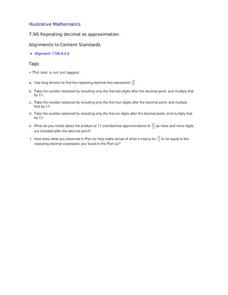Curated OER
Factoring Polynomials
Young mathematicians examine the "Tic-tac-toe" factoring method to factor polynomials. They use algebra tiles to model solutions of binomial multiplication problems. They discuss strategies and observe teacher-made models for solving...
Curated OER
Number: Rounding Off and Approximating
Young mathematicians access a website that leads them through three activities that enable them to practice their rounding and estimation skills when it comes to numbers and math word problems. There is also a very good worksheet...
Curated OER
Identifying Angles
Pupils identify names of angles. They use a large clock to demonstrate angles using certain times of day. Given a geoboard, students create figures with acute, right, and obtuse angles.
Curated OER
Exploring Harmonic Conjugates
High schoolers investigate harmonic conjugates using Cabri Software or the Ti Calculator to analyze harmonics. They explore different angles measurements as they move their circles around and solve problems.
Curated OER
Exponents III- Squares and Square Roots
Students explore the process of inverse operations to solve square root problems. After exploring the perfect squares and area, students examine methods to find square roots by observing the teacher, taking notes, and listing vocabulary...
Curated OER
Surveying: 19 Chains and 50 Links
Through an interdisciplinary instructional activity, emerging engineers explore the history of surveying systems. After discussing various systems, they perform surveys on printable pages. Using their geometric skills, they physically...
Curated OER
Take Three Or Less
Fourth graders play a game clarifying when a game is "fair". They play in pairs stressing that the idea that they work out a winning strategy for the first player. They look for patterns to suggest that they start with a smaller number...
Curated OER
"Math Curse" by Jon Scieszka & Lane Smith
Students use estimation and measurement skills to make predictions and solve problems involving length.
Curated OER
Math Assessment - Kindergarten
Students recall number words in sequence and correctly associate them with a specific set of objects (rational counting). They play a game such as Race to Twenty.
Curated OER
Taking Numbers Personally
Students are given a card with a number on it. They match up with other students holding a different representation of the same number. They create a simple story problem.
EngageNY
Similarity
Learn similarity through a transformations lens! Individuals examine the effects of transformations and analyze the properties of similarity, and conclude that any image that can be created through transformations is similar. The...
EngageNY
Graphing Cubic, Square Root, and Cube Root Functions
Is there a relationship between powers and roots? Here is a activity that asks individuals to examine the graphical relationship. Pupils create a table of values and then graph a square root and quadratic equation. They repeat the...
Illustrative Mathematics
Track Practice
And they're off! While two runners are at track practice, your mathematicians' job is to find out who leaves the other in the dust. The activity provides a variety of data that can be computed into unit rates for comparisons. Available...
Curated OER
Deal Me In
Middle schoolers study the components of a deck of cards and conduct an initial experiment in the probability of drawing various types of cards from a deck. They play two rounds of poker to discover the probability of drawing several...
EngageNY
What Are Similarity Transformations, and Why Do We Need Them?
It's time for your young artists to shine! Learners examine images to determine possible similarity transformations. They then provide a sequence of transformations that map one image to the next, or give an explanation why it is not...
EngageNY
Deriving the Quadratic Formula
Where did that formula come from? Lead pupils on a journey through completing the square to discover the creation of the quadratic formula. Individuals use the quadratic formula to solve quadratic equations and compare the method to...
West Contra Costa Unified School District
Key Features of Graphs
The key is ... After a day of instruction on key features of graphs, groups create a poster and presentation on the key features of their given function graph. The resource provides an extension activity of "telephone" using graphs.
EngageNY
Radicals and Conjugates
Make the irrational rational again! Continuing the theme from previous lessons in the series, the lesson plan relates the polynomial identity difference of squares to conjugates. Learners develop the idea of a conjugate through analysis...
Curated OER
Attack of the Raging River
Students explore mass and volume. In this mass and volume lesson, students pretend to be on a hike and have lost their way. Students must cross a river get back on track. Students must use mass, volume, surface area, density, property...
Curated OER
Ratios for Area and Volume
In this ratios for area and volume worksheet, students solve problems where they find the ratios for problems of shapes dealing with area and volume. Students complete 4 problems.
Virginia Department of Education
Simplifying Square Roots of Whole Numbers
Simplify your life by using a resource on simplifying square roots. Pupils review square roots and calculate values of given radical expressions using a calculator. The lesson concludes by having them consider the results to develop the...
Curated OER
Repeating Decimal as Approximation
You are used to teaching repeating decimals with bar notation that keeps us from writing that number over and over again; now teach what the over and over again represents. This activity allows your mathematicians to explore the infinite...
SaveandInvest.org
Introduction to Earning Interest: Grades 9-10
Does your bank pay you for allowing them to hold your money? The lesson covers three different ways your money can make money. Topics include certificates of deposit, statement savings accounts, and money market accounts.
EngageNY
Incredibly Useful Ratios
Start the exploration of trigonometry off right! Pupils build on their understanding of similarity in this lesson that introduces the three trigonometric ratios. They first learn to identify opposite and adjacent sides before exploring...




